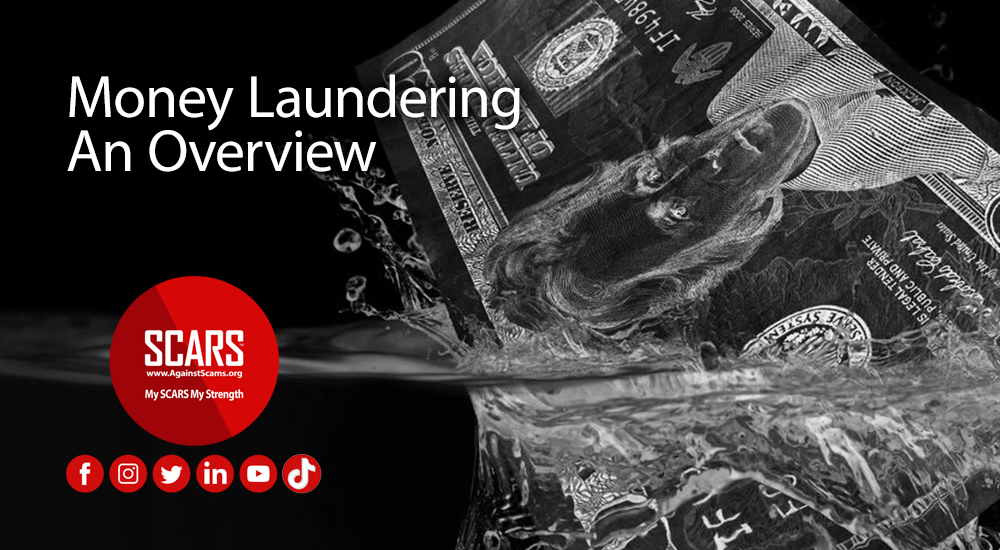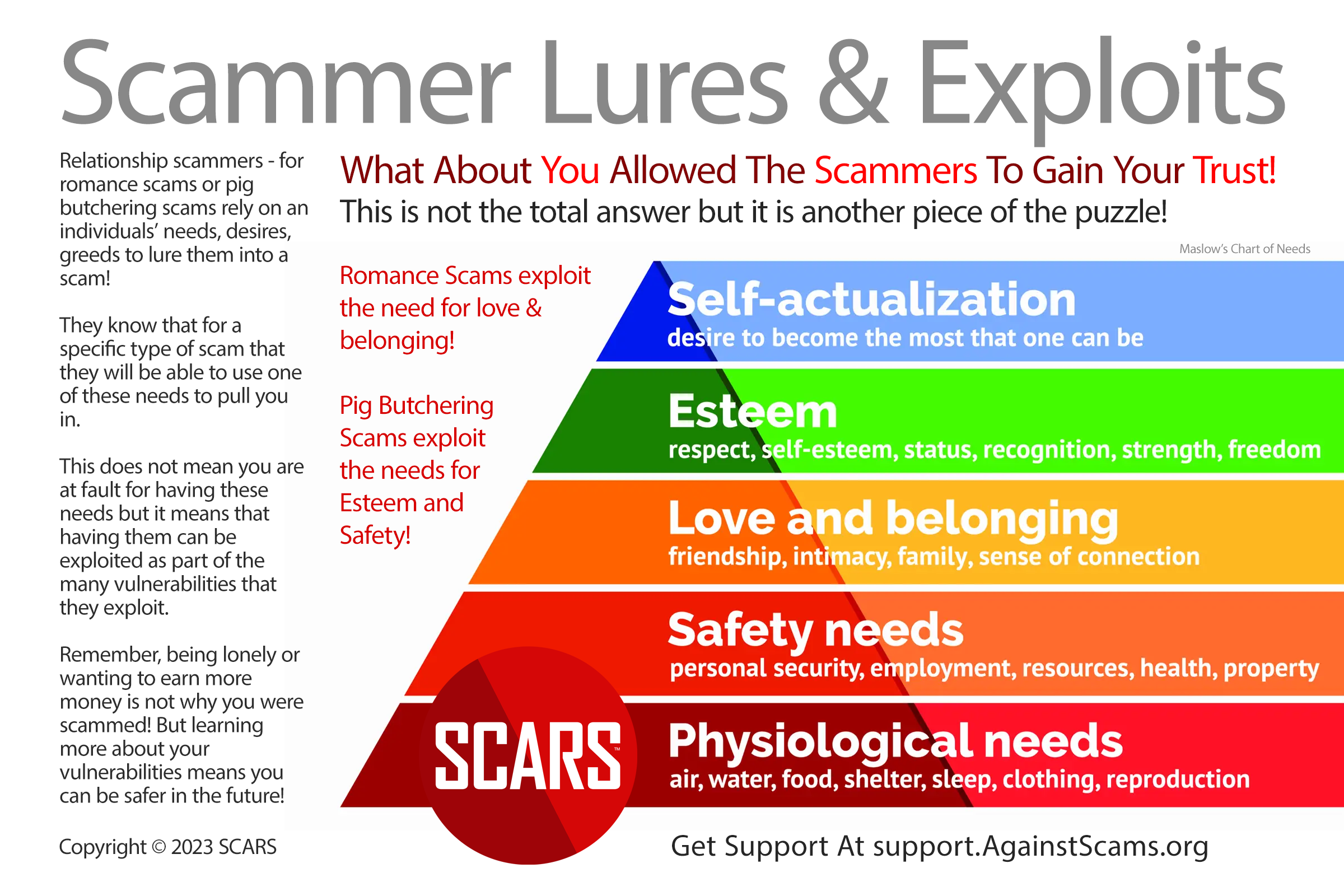
SCARS Institute’s Encyclopedia of Scams™ Published Continuously for 25 Years

Scammers Use And Exploit Victim Needs To Lure Victims In And Control Them
Scammer Lures: Decoding Our Obsession With Needs And Greed
Karl Marx famously said humans are “creatures of need.” But as even this remark suggests, we’ve always been “creatures of want.”
“I’m not needy. I’m wanty.”
Scam victims need to understand how their needs can be exploited and used to lure them into the scam. These are some of the more basic scammer lures they use.
Understanding them can help you both understand what happened to you but also how to avoid scams in the future.
Where Did Our Obsession With Needs And Need Fulfillment Begin?
The most visible resource for this is Maslow’s Hierarchy of Needs. This eminent psychologist proposed that humans are not nearly as transparent in their motivations as the word “need” suggests. We are not driven purely by necessities. Instead, Maslow delved into our collective psyches and unearthed different kinds of needs.
Perhaps Maslow’s limitation — and therefore of those who adopt his framework — is the sweeping label of “needs” he gives to the higher-order life drivers. More appropriately, these are desires. Or, as we could call them, greeds. We use the words greed, desire, and want interchangeably to signal that consumption is no longer driven by necessity.
The Key Point Is That Needs Are Finite, And We Have Long Moved On From Satisfying Them. Greeds, On The Other Hand, Are Infinite
Consider that physiological “needs” are as basic as breathing. However, we no longer merely “need” to breathe to live. We want air purifiers, humidifiers, dehumidifiers, air conditioners, air fresheners, and nonpolluting vehicles. We want rejuvenating areas that satisfy our craving for space that doesn’t cramp us physically or psychologically. Spas are as much a solution for better breathing as they are for better being.
Shoes were originally created in response to a safety “need,” to protect feet from dust, grime, and harm from protruding objects on the ground. We only needed one pair, until they wore out then we needed another. Today, we desire shoes to match our clothes, our occasions, our personalities, and our social milieu. The biggest clue to where the future lies though is still in the plaintive cry of “I need new shoes!” we continue to hear from people.
Our sustenance needs food. But we crave a lot more from food than mere hunger satisfaction. We want to satisfy our desires for gluttony, for things gourmet, for comfort (“just like mom’s cooking”,) bragging rights (“you haven’t eaten at Salt Water Café yet? Where do you live?”,) achievement (“you haven’t arrived until you get the corner table at Bungalow 9”,) and so much more. For protection from the elements, we need shelter. But we want a lot more from the place we live in: elegance, attitude, vibrancy, the right vista, the right address, the right neighbors, the right amenities, the right schools in the neighborhood, the right conveniences, and the social signals that emanate from having all of the preceding.
It is obvious that needs have given way to desires. The hidden truth is that we are all also well on our way to turning desires into needs. Or at least in articulating our desires as our needs.
A new perspective thus emerges of what drives consumption, and in fact, human behavior. The second, deeper meaning is this: Needs define a category (eg food, hunger satisfaction), but desires define societal segments (eg victims, connoisseurs, social butterflies, achievers). Distinct segments desire different inputs and outcomes. And we gravitate toward them instinctively. But criminals use them to exploit us all – they become the scammer lures that enable the scam.
Consider a 21st-century category such as social networking
Social networking serves the need of people to connect with one another. Some people gather on Twitter, friends and family often prefer Facebook, relationship seekers go to dating websites & apps, entertainment seekers throng YouTube, geo-proximate people congregate on FourSquare, the visual stimulus enthusiast community hangs out on Instagram and Pinterest, and so on.
In simpler times, needs were much simpler. Today’s consumers, however, follow a more complex pattern of behavior. Abundant supply and choice in the marketplace signal the primacy of want (or desire or greed) in driving consumption.
So Why Are We Talking About This?
Because this is a driver of part of your vulnerability to scams, fraud, and deception we need you to understand how it plays into vulnerability and becomes a scammer lure. It is a tool that serves as scammer lures that pulls victims into the scam
However, the criminals’ success lies not just in catering to a victim’s wants. That is merely the first step. Lasting success comes from turning that want, that greed into a need over and over again throughout the life of the crime. Basic human nature, even in times of prosperity, tends to be predictably rational (or irrational, actually) in more easily justifying need fulfillment over greed fulfillment for fear of being judged by society as wanton creatures. The elusive formula, then, is to (a) go beyond need, (b) cater to greed, and (c) convert greed to need, in order to create enduring victims.
The bottom line is this. In seeking such desires, people turn to places (in the real world and online) where they think they will find it — as much for desire fulfillment as for choice, experience, and kinship with others who have sought fulfillment of the same desires. Then this becomes the way thatHow did we come to this?
Why did we explore this? Because this is part of what led you into the scam – this is a primary lure mechanism, and the scammers use this helps maintain passivity during the scam. In other words, this is an initial vulnerability and then exploited becomes part of the control mechanisms.
How Does This Apply To Different Scars?
The following will help you understand how needs set you up for failure and served as lures that scammers use to pull you in.
- Romance scams – the need in this case is the need for a relationship. Even if the victim did not want a relationship there was a need for human connection – someone to talk to and who would listen.
- Pig Butchering Scams – these begin in much the same way as a romance scam with basically the same need, but instead of carrying through on the full level of manipulation, the scam flips the need to a different type of greed. Why do people invest? They want what more money brings – so instead of heavy manipulation, this need drives the scam through to the end.
- Lotto Scams – this is a simpler kind of need or greed, the desire for a boatload of money, not at investment levels, but money falling from the sky levels.
- Phone Scams – most phone scams are based upon a desire for safety – they are fear-based – someone or something is in trouble and the person on the phone can fix it and take away the fear.
- Phishing Scams – these are the outliers, there is really no specific desire per se. The message can define the desire, but often it is just poor impulse control that results in these.
In essence, these are the desires, needs, greeds, that scammers use to lure you in. But once lured in, they own you until the scam ends or they make a functional mistake during their execution of the crime.
But You Felt It Was Not Right?
Keep in mind that victims often sense things during the scam. We don’t disagree with that, but we do not believe it is what victims believe they are.
- In a romance scam, it is also an abusive relationship. So victims sensed the abusive aspects of it without being aware of the crime.
- In the case of investment scams, it is often the case that the victim will have doubts about the amount of money they are investing – a kind of advance remorse or doubts – not about the crime being committed, but just about the investment risk itself.
Summary
It is very important to eventually deconstruct the scam into its relevant parts so that you can understand why it happened, what the initial mistake was, and why you are not to blame.
Your biases and coping mechanism will tell you it was different than this, but when you have the ability to think this through you will come to accept it.
In the meantime, accept that you are the victim of well-trained professional criminals and you were neither prepared nor skilled enough to avoid the scam.
There is no shame or blame in that!
-/ 30 /-
What do you think about this?
Please share your thoughts in a comment below!
Table of Contents
- Methods Scammers Use That Exploit Your Vulnerabilities
- Scammers Use And Exploit Victim Needs To Lure Victims In And Control Them
- Scammer Lures: Decoding Our Obsession With Needs And Greed
- Where Did Our Obsession With Needs And Need Fulfillment Begin?
- The Key Point Is That Needs Are Finite, And We Have Long Moved On From Satisfying Them. Greeds, On The Other Hand, Are Infinite
- So Why Are We Talking About This?
- How Does This Apply To Different Scars?
- But You Felt It Was Not Right?
- Summary
LEAVE A COMMENT?
Thank you for your comment. You may receive an email to follow up. We never share your data with marketers.
Recent Comments
On Other Articles
- on Love Bombing And How Romance Scam Victims Are Forced To Feel: “I was love bombed to the point that I would do just about anything for the scammer(s). I was told…” Feb 11, 14:24
- on Dani Daniels (Kira Lee Orsag): Another Scammer’s Favorite: “You provide a valuable service! I wish more people knew about it!” Feb 10, 15:05
- on Danielle Delaunay/Danielle Genevieve – Stolen Identity/Stolen Photos – Impersonation Victim UPDATED 2024: “We highly recommend that you simply turn away form the scam and scammers, and focus on the development of a…” Feb 4, 19:47
- on The Art Of Deception: The Fundamental Principals Of Successful Deceptions – 2024: “I experienced many of the deceptive tactics that romance scammers use. I was told various stories of hardship and why…” Feb 4, 15:27
- on Danielle Delaunay/Danielle Genevieve – Stolen Identity/Stolen Photos – Impersonation Victim UPDATED 2024: “Yes, I’m in that exact situation also. “Danielle” has seriously scammed me for 3 years now. “She” (he) doesn’t know…” Feb 4, 14:58
- on An Essay on Justice and Money Recovery – 2026: “you are so right I accidentally clicked on online justice I signed an agreement for 12k upfront but cd only…” Feb 3, 08:16
- on The SCARS Institute Top 50 Celebrity Impersonation Scams – 2025: “Quora has had visits from scammers pretending to be Keanu Reeves and Paul McCartney in 2025 and 2026.” Jan 27, 17:45
- on Scam Victims Should Limit Their Exposure To Scam News & Scammer Photos: “I used to look at scammers photos all the time; however, I don’t feel the need to do it anymore.…” Jan 26, 23:19
- on After A Scam, No One Can Tell You How You Will React: “This article was very informative, my scams happened 5 years ago; however, l do remember several of those emotions and/or…” Jan 23, 17:17
- on Situational Awareness and How Trauma Makes Scam Victims Less Safe – 2024: “I need to be more observant and I am practicing situational awareness. I’m saving this article to remind me of…” Jan 21, 22:55
ARTICLE META
Important Information for New Scam Victims
- Please visit www.ScamVictimsSupport.org – a SCARS Website for New Scam Victims & Sextortion Victims
- Enroll in FREE SCARS Scam Survivor’s School now at www.SCARSeducation.org
- Please visit www.ScamPsychology.org – to more fully understand the psychological concepts involved in scams and scam victim recovery
If you are looking for local trauma counselors please visit counseling.AgainstScams.org or join SCARS for our counseling/therapy benefit: membership.AgainstScams.org
If you need to speak with someone now, you can dial 988 or find phone numbers for crisis hotlines all around the world here: www.opencounseling.com/suicide-hotlines
A Note About Labeling!
We often use the term ‘scam victim’ in our articles, but this is a convenience to help those searching for information in search engines like Google. It is just a convenience and has no deeper meaning. If you have come through such an experience, YOU are a Survivor! It was not your fault. You are not alone! Axios!
A Question of Trust
At the SCARS Institute, we invite you to do your own research on the topics we speak about and publish, Our team investigates the subject being discussed, especially when it comes to understanding the scam victims-survivors experience. You can do Google searches but in many cases, you will have to wade through scientific papers and studies. However, remember that biases and perspectives matter and influence the outcome. Regardless, we encourage you to explore these topics as thoroughly as you can for your own awareness.
Statement About Victim Blaming
SCARS Institute articles examine different aspects of the scam victim experience, as well as those who may have been secondary victims. This work focuses on understanding victimization through the science of victimology, including common psychological and behavioral responses. The purpose is to help victims and survivors understand why these crimes occurred, reduce shame and self-blame, strengthen recovery programs and victim opportunities, and lower the risk of future victimization.
At times, these discussions may sound uncomfortable, overwhelming, or may be mistaken for blame. They are not. Scam victims are never blamed. Our goal is to explain the mechanisms of deception and the human responses that scammers exploit, and the processes that occur after the scam ends, so victims can better understand what happened to them and why it felt convincing at the time, and what the path looks like going forward.
Articles that address the psychology, neurology, physiology, and other characteristics of scams and the victim experience recognize that all people share cognitive and emotional traits that can be manipulated under the right conditions. These characteristics are not flaws. They are normal human functions that criminals deliberately exploit. Victims typically have little awareness of these mechanisms while a scam is unfolding and a very limited ability to control them. Awareness often comes only after the harm has occurred.
By explaining these processes, these articles help victims make sense of their experiences, understand common post-scam reactions, and identify ways to protect themselves moving forward. This knowledge supports recovery by replacing confusion and self-blame with clarity, context, and self-compassion.
Additional educational material on these topics is available at ScamPsychology.org – ScamsNOW.com and other SCARS Institute websites.
Psychology Disclaimer:
All articles about psychology and the human brain on this website are for information & education only
The information provided in this article is intended for educational and self-help purposes only and should not be construed as a substitute for professional therapy or counseling.
While any self-help techniques outlined herein may be beneficial for scam victims seeking to recover from their experience and move towards recovery, it is important to consult with a qualified mental health professional before initiating any course of action. Each individual’s experience and needs are unique, and what works for one person may not be suitable for another.
Additionally, any approach may not be appropriate for individuals with certain pre-existing mental health conditions or trauma histories. It is advisable to seek guidance from a licensed therapist or counselor who can provide personalized support, guidance, and treatment tailored to your specific needs.
If you are experiencing significant distress or emotional difficulties related to a scam or other traumatic event, please consult your doctor or mental health provider for appropriate care and support.
Also read our SCARS Institute Statement about Professional Care for Scam Victims – click here to go to our ScamsNOW.com website.

















I appreciate the explanation as to how scammers use the innate desires/needs victims have to be vulnerable to being pulled into the scam.
I definitely had “red flags” at times during my romance scam, but rationalized that I had to be wrong since my “boyfriend” loved me.
Appreciate all these definitions and explanations. They will help me to recognize future targeting attempts.
This is an integral part of my scam I’ve been trying to figure out. I was part of a romance scam. The scammer impersonated a celebrity I really wanted to meet. It was a big jump from just wanting to meet to being in love. But that is what happened. I figured out today with the help of my therapist that along with wanting to meet the celebrity I wanted a connection. Just someone who valued me. In my life I am a caregiver, most everything that I do is done to care for others in my family. My husband while being a good husband often is busy with his never ending “to do list” that he creates himself, or he’s at work or he’s helping someone out. I feel like I am at the end of his list. I wanted to be appreciated just for being me, not what I do. I am approaching a milestone birthday. I wasn’t feeling feminine and I was being addressed as Sir at work helping customers. I don’t look much like a man but it was happening. Then I got a medical diagnosis that rocked my world. On top of everything else I was feeling vulnerable, depressed and out of options. I just needed to hear someone say with compassion “I understand…”
I was a victim of a pig butchering scam. When my scammer first introduced cryptocurrency, I shut it down right away and refused to discuss it any further. After my divorce, I cleaned up a lot of debt accumulated by my ex and I was finally in a comfortable place financially and had a good financial plan moving forward. My scammer didn’t discuss it for a while and started to focus more on building the trust and romance. They later brought it up again and I finally agreed to at least allow them to educate me. Even though I wasn’t in need of more money, the idea sounded nice. They also painted this dream of living a comfortable extravagant life together, which would have been a nice change from my previous marriage where I was drowning in debt. I knew it all sounded too good to be true. But it was something I really wanted so I chose to believe it.
The formula of behavior that drives wants, needs and greed in consumption spoke to me so loudly. Scammers use this to (a) go beyond need, (b) cater to greed, and (c) convert greed to need in order to create enduring victims. That is why I was scammed for so many years. Bless my naive little heart!
My pig butcher created a fake trading platform where I was making hundreds of thousands of dollars. Greed was definitely in play even though I was already retired and living comfortably.
Excellent article, short and sweet explanations.